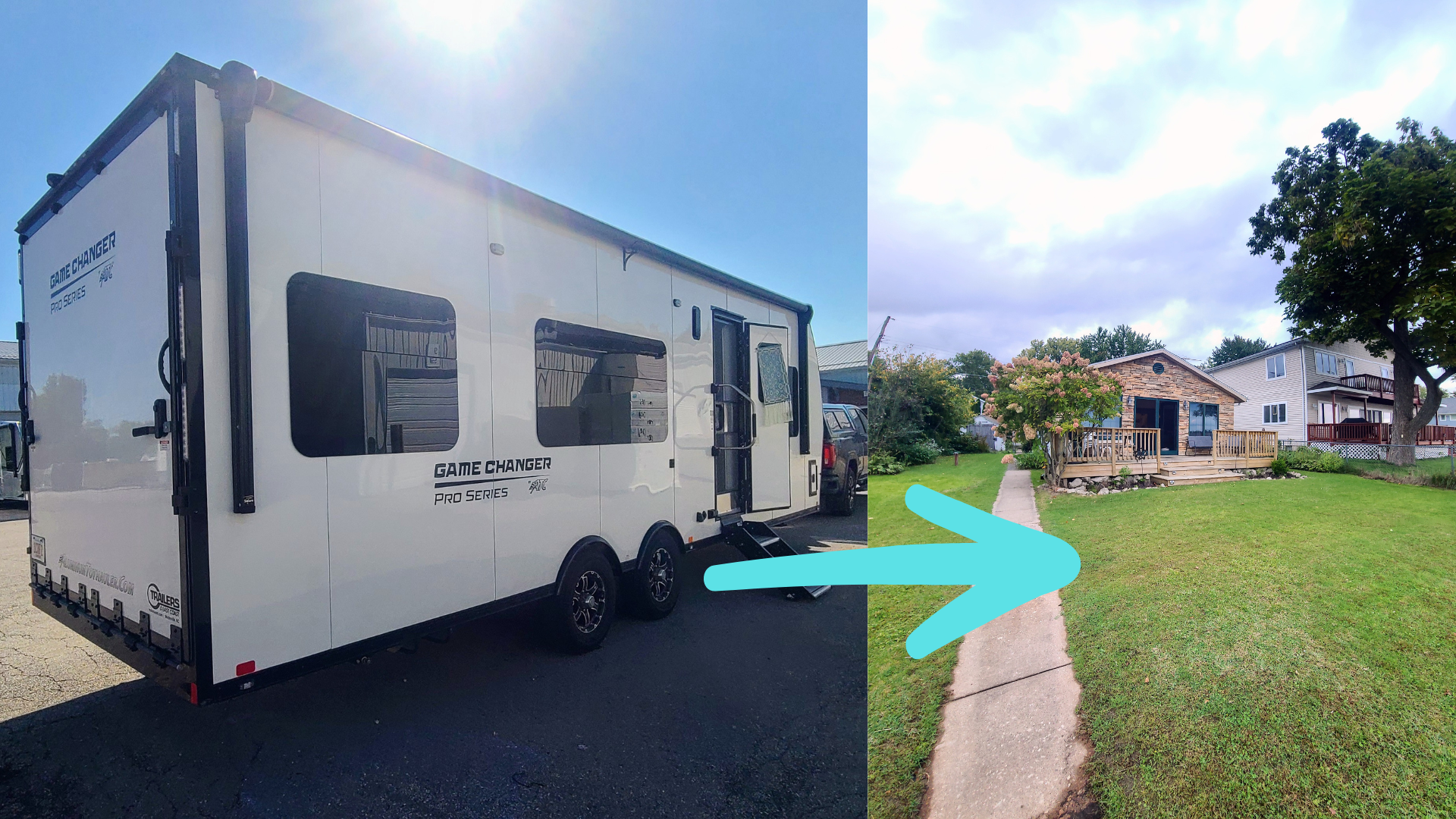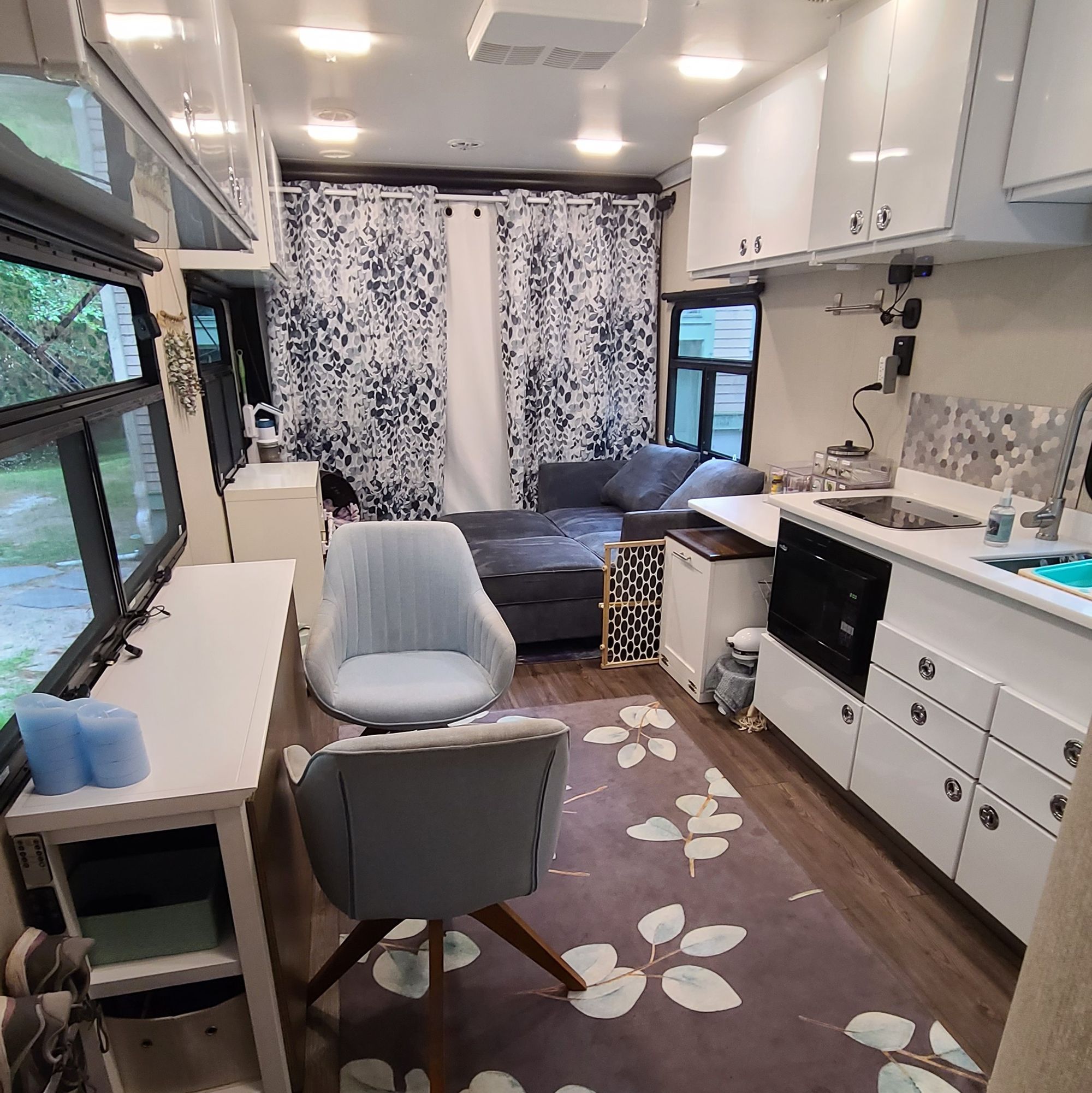Displaced from your RV? These 10 tips can make your experience smoother

If you're a full-time RVer, chances are at some point you'll need to take your RV in for repairs. This means you'll be faced with the challenge of finding accommodations and will essentially be moving out of your rig temporarily. It's no easy task. For one, we're not as used to packing as we possibly once were, because typically we bring our entire home with us wherever we go. We may not even have suitcases to pack belongings into! Then there's the planning and booking process, and the actual moving out. It's a daunting ordeal, and it turns a lot of heads. Imagine the confusion of onlookers when they see someone checking into a hotel for 3 nights, carting along almost everything they own! It's just one of the things we need to do in order to live life on the road. It's not always glamorous, and it's sometimes a lot of work, but the whole process can be made easier - and maybe even a little fun - with some tips we've learned from our experiences.
We've been displaced from our trailer twice this year. The first time was for a 2-day servicing appointment, and the second time was longer because we needed repairs done after a natural disaster. We learned a lot in the process the first time and were able to streamline it even better the second time around. Here are our best tips.
1. Make sure you have full-time RV insurance.

This is important for a number of reasons, but in this case, your full-time insurance might contain a clause that states you will get reimbursed for accommodations should you need to leave your RV overnight. Oftentimes insurance companies will pay up to a certain amount of hotel stays if you're displaced from your home-on-wheels. We have insurance that reimburses us up to $5000, which is more than enough unless there is some extreme situation. Just be sure to double check with your insurance company on what specifically is covered, as some circumstances may count as a voluntary displacement versus being forced out of your RV.
2. Always have an emergency/repairs fund.

Before we launched full-time, we said we did not want to hit the road until we had a sufficient emergency fund. This number may be different for everyone, but for us, we set it at $7,000. We figured this was enough to cover repairs, and if God forbid we needed to get off the road, we'd have seed money. Keep in mind that we also work on the road, so we continue to have cash flow to replenish this fund, and we also have other savings from the sale of our house that we could dip into if we desperately needed to. The fund can serve to pay off repairs that are not covered under warranty or insurance, or you can use the money to pay expenses before getting reimbursed.
3. Keep your RV organized.

You may be wondering what this has to do with leaving your RV. Quite a lot, actually. It makes finding things to pack easier. More so, we keep a lot of our stuff in bins, boxes, and bags. When we're in our trailer, we use them for storage and organization. When we need to pack things out of our trailer, we can simply empty the bins and boxes and refill them with items we're taking with us. Now we have easy, organized ways to carry our belongings to our truck and into our accommodations. When we're back in the rig, those boxes service a purpose, so we're not carting around empty bins on the road.
4. Put in writing a list of repairs you expect to get done while your RV is in the shop.

Emailing the list to the dealer/manufacturer/repair shop can be helpful. You want all involved parties to have a copy for reference. Also don't be afraid to check in while your RV is getting repaired. The communication isn't always ideal in these situations, and this is your home, so don't worry about being intrusive. Just be nice about it; the RV business is booming so the workers are likely stressed. Show that you appreciate their work, even if it means needing to take the initiative to make sure everything gets done.
5. Choose a place that's comfortable and functional for your entire family.

We're so used to living tiny that we don't care if we have a lot of physical space. What we do care about is whether or not that space is functional so that we can continue our routines. We're a working couple traveling with two pets, so our priorities are to have space to work and a safe space for the animals. We also love home-cooking and seek accommodations with at least some kitchen appliances so that we aren't slaves to takeout the entire time we're displaced. Another tip: If you're going somewhere without a full kitchen, do you have small appliances you can take from your RV, such as a skillet or Instant Pot? Consider packing them! Chances are when you drop off our RV, you'll need to clear out the fridge and freezer, so finding accommodations with a fridge is a must. Then, using the provided kitchen or your small appliances, you can cook the food you packed with you, which will mean less to bring back to the RV later on.
6. Reframe your displacement as an opportunity to experience something new.

You've got comfortable and functional covered, but also consider choosing somewhere fun! It's difficult leaving your home, but don't let the life of adventure stop just because your RV is in the shop. Perhaps you want to research unique Airbnbs and find a cabin or a tiny home. Maybe you're in the mood to rent a cottage on the lake! Embrace the temporary nature of your displacement, and remember that no matter where you end up, you won't have to be there forever.
7. When booking your accommodations, consider booking a buffer day on either side of your reservation.

For instance, back in May we were told that our servicing appointment would take two days, Monday and Tuesday. We booked our accommodations to arrive on Sunday and leave on Wednesday. That way if we need the hotel or Airbnb, it's there, but if we don't, we'll eat the cost of those nights. This might seem like a waste of money, but it provides peace of mind in case something doesn't go to plan. Plus, if your displacement is covered by insurance, those days will likely be covered as well. Even if your stay isn't covered by insurance - ours in May wasn't because it was routine servicing - we use money from our emergency/repairs fund to pay for the extra nights.
8. Clean out the back of the truck, moving out everything that's RV-related or won't be needed.
The first time we were displaced from our trailer, we stayed at a place 5 minutes up the street. This allowed us to drop the trailer off at the dealer and make two trips bringing stuff from the trailer over to our Airbnb. It worked OK, but it was a ton of work. So the second time we were displaced, we came up with a better solution: clean out the back of the truck, making space for everything we need for our displacement, and leaving the RV-related things behind.

For example, our bins with our hoses are in the back of our truck, but those can easily stay with the RV. Just make sure you disinfect the bins before putting them in your rig, especially the sewer hose bin! You can even lay down a few garbage bags and put the bins on top. Anything to keep your rig as sanitary as possible. Of course this is more of a tip for those who are towing, rather than motorhome owners, but the bottom line is to try to only take what's needed for non-RV living, and leave the RV items with the RV.
9. Drop your RV off the night before.

This is another place where your buffer days come in handy. If you have your hotel or Airbnb a night early, see if you can drop your rig off the evening before its appointment. Even if it's after hours, sometimes places will have a designated parking spot where you can leave your RV and a dropbox for the key. Or, try to drop the RV off near the end of work hours, so you can leave it before the workers leave for the day. This way you're not scrambling to move out of your RV in the wee hours of the morning or feeling pressured to get your rig to the workers on time. They'll already have your RV and can begin work when they're ready.
10. No matter when you choose to drop off your RV, check with the workers and specifically ask what you need to do to get your rig ready for them.

We've heard of/experienced many instances where we think a certain cabinet or storage area needs to be emptied, only to discover it wasn't necessary. One of our repairs was getting the platform for our bed replaced. We thought we'd have to clean out the entire storage area under the bed, but when we dropped the trailer off, they said not to bother. So, do the packing you know you have to do ahead of time, but the parts you aren't sure about, wait until you have a definitive answer, and it could save you lots of unnecessary packing.
Living full-time in our RV, we get so accustomed to having all our belongings with us all the time. We use the RV as a safe, comfortable base to explore from. This makes moving out challenging due to the need to pack, but also grappling with the emotions of leaving our home. With some advanced planning and little tips to ease the process, displacement can end up being an enjoyable time that you can add to your list of adventures.

